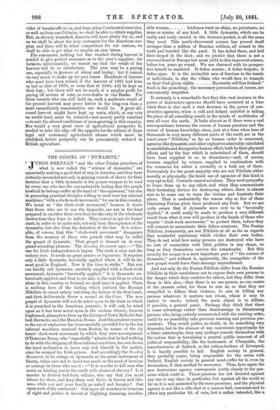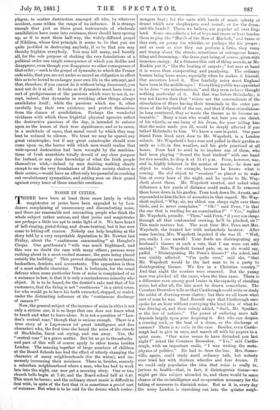THE GOSPEL OF "DYNAMITE."
" JUDGE BRENNAN " and the other Fenian preachers of what is now called the "science of dynamite," are apparently making a good deal of way in America, and they have certainly succeeded not only in gaining rounds of cheers for their 'doctrine that a little dynamite is the proper weapon to be used by every one who has the uncomfortable feeling that the people towhich he belongs suffer at the hand of "the oppressor," but also in procuring practical disciples willing to send over ten infernal machines," with a clock-work movement," for use in this country. We insist on "the clock-work movement," because it shows that those who are to use the dynamite, are not in the least prepared to sacrifice their own lives for the sake of the wholesale destruction they hope to inflict. They intend to get six hours' start, in order to be quite safe, not only from the explosion of the dynamite, but also from the detection of the law. It is notice- able, of course, that this "clock-work movement" disappears from the memory of those who preach what may be called the gospel of dynamite. That gospel is dressed up in very grand-sounding phrases. The Sunday Democrat says :—" The war for Irish Independence is begun. The work is easy and the victory sure. It needs no great armies or big navies. It requires only a little dynamite, heroically applied where it will do the most good in England. Now is the time to strike." But you can hardly call dynamite carefully supplied with a clock-work movement, dynamite "heroically applied ;" it is dynamite un- heroically applied, and that is, we take it, the real form in which alone in this country or Ireland, we shall have it applied. There is nothing here of the feeling which induced the Russian Nihilists to stand calmly watching the failure of the first bomb, and then deliberately throw a second at the Czar. The new gospel of dynamite will not be acted upon in the form in which it is preached in the American journals; it will only be acted upon as it has been acted upon in the various clumsy, because frightened, attempts to blow up the Liverpool Town Hall, the Sal- ford Barracks, and the Mansion House. And this prudent reserve in the use of explosives has been carefully provided for in the ten infernal machines received from Boston, by means of the six hours' clock-work movement by which they were accompanied. O'Donovan Rossa, who "regretfully" admits that he had nothing to do with the shipping of these infernal machines, has not shown the least inclination to incur any risk himself in the matter, since he escaped his Irish prison. And accordingly the Sunday Democrat, in its eulogy on dynamite as the great instrument of liberty, takes care not to insist too much on the need of heroism or courage in those who use it :—" Is it murder to kill men who insist on binding you to the earth with chains of slavery ? Is it murder to destroy hell-born villains, who say that you must labour for them, and keep them and theirs in luxury and idle- ness, while you and your family go naked and hungry ? Out upon such sickly sentiment! Out upon all mendacious evasions of right and justice in favour of blighting, damning, insuffer-
able wrongs Irishmen want no ships, no privateers, no arms or armies of any kind. I little dynamite, which can be easily and cosily carried in the trousers-pocket, is all the arms they need. This newly-discovered science has proved itself stronger than a million of Russian soldiers, all armed to the teeth and bearded like the pard. It has defied them, and laid their despot in the dust; and we predict that there is not a crowned head in Europe but mast yield to this improved science, before ten years go round. We are charmed with its prospec- tive benefit to mankind. It defies armies ; it defies despots; it defies spies. It is the invincible arm of freedom in the hands of individuals, to slay the villain who would dare to trample on their God-given rights Dynamite will free Ireland." Such is the preaching; the necessary precautions, of course, are conveniently forgotten.
It certainly is a remarkable fact that this vast increase in the power of destructive agencies should have occurred at a time when there is also such a vast decrease in the power of con- structive agencies, when a cold and defiant unbelief is taking the place of all ennobling creeds in the minds of multitudes of men all over the earth. It looks almost as if there were a real correspondence between the course of human passions and the course of human knowledge, since, just at a time when tens of thousands in very many different parts of the earth are in the exact sense "Nihilists," so far as human order is concerned, agencies like dynamite, and other explosives admirably calculated to annihilate and disorganise human effort, both by their physical effects and by the fear which is entertained of them, should have been supplied to us in abundance,—and, of course, because supplied by science, supplied in combination with the resources for either a cowardly or a bold use of them. Fortunately fur the great majority who are not Nihilists either morally or physically, the timid use of agencies of this kind is very apt to fail. Cowards cannot act alone. They need sympathy to brace them up to any effort, and when they communicate their hesitating devices for destroying others, there is almost sure to be some one to warn the victims and frustrate their plans. That is undoubtedly the reason why so few of these blustering Fenian plots have produced any fruit. But we are quite aware that if dynamite were ever to be "heroically applied," it could easily be made to produce a very different result from what it ever will produce in the hands of those who require "clock-work movements" to protect them, before they will consent to assassinate their fellow-creatures. The Fenian Nihilists, fortunately, are not Nihilists at all so far as regards that wonderful machinery which vivifies their own bodies. They do not mind how many persons are destroyed who have no sort of connection with Irish politics in any shape, so long as they themselves survive the catastrophe. But this security for escape is a most important part of "the science of dynamite," and without it, apparently, the evangelists of the new gospel would leave their message nnproclaimed.
And not only do the Fenian Nihilists differ from the Russian Nihilists in their carefulness not to expose their own persons to the danger which they contrive for others, but they differ from them in this also,—that there is no one person, no one centre of the present order, for them to aim at, so that they are compelled to diffuse their violence, to aim at killing any persons whatever, it matters not whom, whom it may be easiest to reach; indeed, the main object is to diffuse, if possible, a general panic. Perhaps they think that there is some advantage rather than disadvantage in threatening persons who, being entirely unconnected with the existing order, could by no possibility take previous warning and previous pre- cautions. They would prefer, no doubt, to do something very dramatic, but in the abseuce of any convenient opportunity for a State catastrophe, they may perhaps console themselves with the notion that in terrorising a general public innocent of all political responsibility, like the tradesmen of Cheapside, the manufacturers of Salford, or the cotton-brokers of Liverpool, it is hardly possible to fail. English society in general, they probably argue, being responsible for the union with Ireland, English society in general must suffer for it, even by decimation, if that method be necessary. Thus, here again the new destructive agency corresponds pretty closely to the pas- sions which wield it. Those passions are not directed against any one or any class in particular, but against all the world so far as it is not animated by the same passions; and the physical agency is not like a rifle-shot or a cannon-ball, commissioned to effect any particular bit of ruin, but is rather intended, like a,
plague, to scatter destruction amongst all who, by whatever accident, come within the range of its influence. It is strange enough that just as these great instruments of wholesale annihilation have come into existence, there should have sprung up, as if to meet them half-way, the widely-diffused gospel of Nihilism, whose first principle it seems to be that you are quite justified in destroying anybody, if so be that you may thereby frighten everybody. You may kill many, and horrify all, for the sole purpose of shaking the very foundations of a political order one single consequence of which you dislike and flisapprove, even though you disapprove no other consequence of that order ;—such is the gospel of dynamite, to which the Fenian code adds, that you are not under so sacred an obligation to effect this as to be bound to endanger your own life in the attempt, and that, therefore, if you cannot do it without being discovered, you ,need not do it at all. It looks as if dynamite must have been a sort of prefigurement of the passions which were to use it, ex- cept, indeed, that dynamite in wrecking other things always annihilates itself ; while the passions which use it, often carefully hug their own existence, and protect themselves from the chance of annihilation. Perhaps the wonderful vividness with which these frightful physical agencies reflect the destructive passions of the day, is intended to enforce upon us the lesson of their true significance, and so to cause, in a multitude of cases, that moral recoil by which they may best be reduced to silence. We trust we may be spared any great catastrophe ; but if any great catastrophe should ever come upon us, the horror with which men would realise that wide-spread destruction had been wrought by the machina- tions of Irish anarchists totally devoid of any clear purpose for Ireland, or any clear knowledge of what the Irish people themselves wish,—indeed by men desiring nothing clearly except to see the very foundations of British society shaken to their centre,—would have an effect only too powerful in crushing out revolutionary sympathies, and setting men on their guard against every trace of these anarchic emotions.



































 Previous page
Previous page